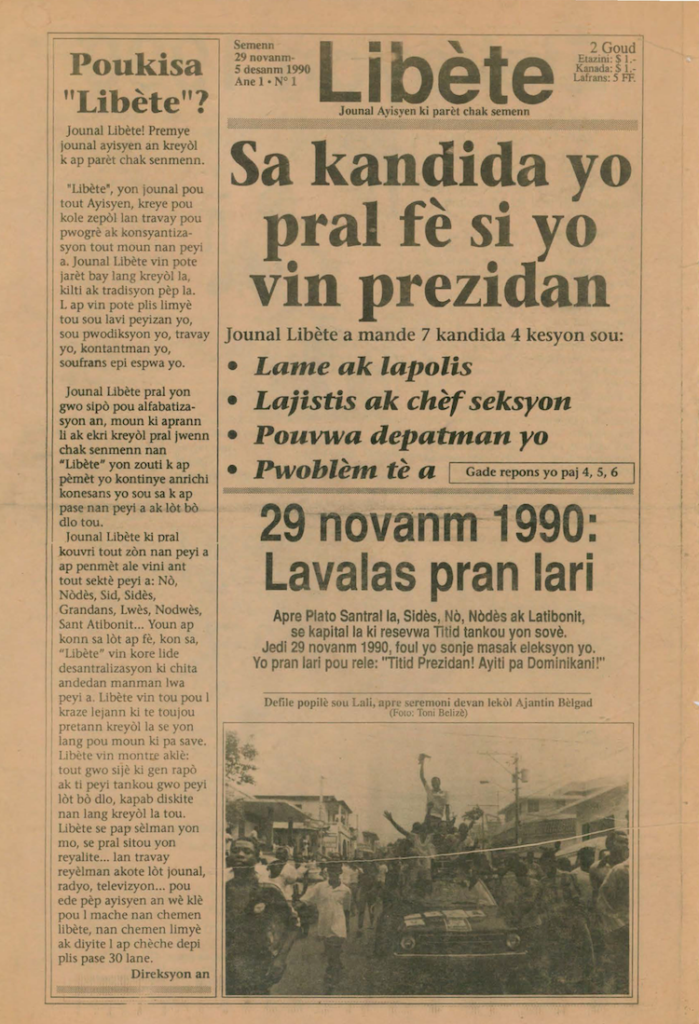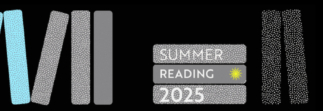See below for a Kreyòl translation of this story by Prof. Paul Belony
Tout moun se moun, tout lang se lang
Every person is equally human, every language is on a par as language
 Founded by Father Jean-Yves Urfié in November 1990, Haiti’s weekly newspaper Libète aimed to fill a linguistic and cultural void in Haiti as it was published in Kreyòl, the national language of Haiti, as opposed to French, the primary written language at the nation’s schools, courts, and administrative offices though it is fluently spoken by few. Though it was founded by a priest, Libète was a not-for-profit, secular newspaper, respectful of all religious beliefs, independent of political parties. It covered politics, health, agriculture, as well as human rights and social movements. It was the only newspaper with a substantial (70%) distribution in the provinces, outside the capital Port-au-Prince. The importance of the newspaper increased between 1990-1995, during the years of military dictatorship, when it continued to operate semi-clandestinely, advocating for a return to democracy. The latter is one of the reasons for its popularity alongside its affordable price which suited the modest means of most Haitians. Libète stopped operating in 1998 due to lack of funds.
Founded by Father Jean-Yves Urfié in November 1990, Haiti’s weekly newspaper Libète aimed to fill a linguistic and cultural void in Haiti as it was published in Kreyòl, the national language of Haiti, as opposed to French, the primary written language at the nation’s schools, courts, and administrative offices though it is fluently spoken by few. Though it was founded by a priest, Libète was a not-for-profit, secular newspaper, respectful of all religious beliefs, independent of political parties. It covered politics, health, agriculture, as well as human rights and social movements. It was the only newspaper with a substantial (70%) distribution in the provinces, outside the capital Port-au-Prince. The importance of the newspaper increased between 1990-1995, during the years of military dictatorship, when it continued to operate semi-clandestinely, advocating for a return to democracy. The latter is one of the reasons for its popularity alongside its affordable price which suited the modest means of most Haitians. Libète stopped operating in 1998 due to lack of funds.
Libète is important to linguists, historians, anthropologists, and social justice activists as it is one of the important resources that played a key role in advocating for Kreyòl as the primary language in education, administration, and legislation in Haiti (the term “Kreyòl” distinguishes Haitian Creole from other Creole languages). Libète was not digitized or accessible until Bibliothèque Haïtienne des Spiritains (BHS), Digital Library of the Caribbean (dLOC) and MIT Libraries collaborated for the first time in 2022 to make it available on the dLOC site and soon on the MIT Libraries’ catalog. This will be an invaluable resource for scholars interested in Haiti, especially those who design or study linguistic policy in support of universal access to quality education in Haiti.
MIT Libraries provided partial funding for the digitization of archival content (held by BHS) in partnership with dLOC , as a model for supporting open digital access to unique materials not available otherwise.
One of the partners, dLOC, was founded in 2004, and BHS has been a dLOC partner since 2008. Together with more than eighty dLOC partners in the Caribbean, U.S., Europe and Canada, BHS has shared know-how, expertise, and content on the dLOC website. dLOC is a collection of collections provided by its partner base. It serves an international community of scholars by providing enhanced electronic access to research resources about the Caribbean and Circum-Caribbean. Digitized materials are searchable, many are downloadable and thus available for all forms of research and/or as teaching resources. Libète Newspaper is now part of the largest collection of digitized Caribbean newspapers and ready for anyone to use. (1)
A key stakeholder in this collaboration has been MIT Linguistics professor Michel DeGraff, who is renowned for advocating for the use of Kreyòl as the primary language of instruction in Haiti, for increasing access to quality education, including education in STEM and in foreign languages (French, English, Spanish, etc.). “Libète contains unique language-related content that can be used for research on orthographic practices for Kreyòl, as well as research on Haitian history and society, education policy and cultural/linguistic revival materials—all of which are, indeed, invaluable for my work,” says DeGraff.
DeGraff is one of two co-directors of the MIT-Haiti Initiative with Prof. Haynes Miller (MIT Mathematics) and is a founding member of the Akademi Kreyòl Ayisyen which, in his own words, “is still struggling to decide what changes can/should be brought to Kreyòl’s official orthography.” These decisions about Kreyòl orthography are relevant for language-in-education policies, which, in turn, are closely related to Haiti’s centuries-long struggle with colonial hierarchies that shaped culture and expressions of political power in Haiti. More broadly, DeGraff is also a staunch advocate for the widespread use of Open Educational Resources, especially for the benefit of populations that have traditionally been deprived of access to educational resources.
This BHS-dLOC-MIT Libraries partnership provides access to content not available through the existing subscription-based models and exemplifies MIT Libraries’ commitment to social justice and open, accessible, and equitable scholarship. It also constitutes a promising alternative model to providing access to content, exemplifying the Libraries’ vision.
(1) For more context about the significance of digitizing Haitian archives see, Findlay, Fiona (2023) The practical and ethical considerations of digitising Haitian literary archives. MPhil(R) thesis, University of Glasgow. What’s not mentioned in Findlay (2023) is the important contribution of private libraries such as the Bibliothèque Haïtienne des Spiritains (BHS) and the Bibliothèque Haïtienne des Frères de l’Instruction Chrétienne (BHFIC) to the preservation of Haitian archives.
Wholehearted thanks to:
BHS Team
Islande Elysee, Manager
Benjamin Osio, Administrator
Patrick Tardieu, Curator
Special thanks to Prof. Jean Casimir, historical sociologist at Haiti’s State University, who first introduced Michel DeGraff to Patrick Tardieu and who suggested that MIT Libraries collaborate with BHS.
dLOC Team
Judith Russell, Dean, George A. Smathers Libraries, University of Florida
Stephanie Chancy, dLOC Operational Lead, University of Florida
Laura Perry, dLOC Technological Director, University of Florida
Laurie Taylor (former dLOC Operational Lead, University of Florida)
MIT Team
Martina Anderson, Acquisitions and Appraisal Librarian
Michel DeGraff, Professor of Linguistics
Laura Hanscom, Head of Scholarly Communications and Collections Strategy
Deborah Lenares, Collections Analyst and Strategist
Marcella Tam, Collection Strategist for Tangible Collections and Humanities, Art, Social Sciences, and Architecture & Planning
Ece Turnator, Humanities and Digital Scholarship Librarian
Katie Zimmerman, Director of Copyright Strategy
Tout moun se moun, tout lang se lang: Nan lide pou MIT Libraries tabli patenarya, n ap kontribiye nan kreyasyon vèsyon nimerik Jounal Libète ki te pibliye ann Ayiti, an kreyòl, ant lane 1990 ak 1998.
Se Pwofesè Paul Belony ki fè tradiksyon kreyòl sa a.
Se Pè Jean-Yves Urfié ki te fonde jounal Libète an novanm 1990. Jounal sa a te pibliye chak semèn an kreyòl nan objektif pou l konble yon vid lengwistik e kiltirèl ann Ayiti. Wi, kreyòl se lang nasyonal peyi d Ayiti a. Men, se franse ki sèvi pi plis nan dokiman pou lekòl, tribinal ak biwo administratif nan tout peyi a menm si pa gen anpil moun ki pale l byen. Menm si se te yon pè katolik ki te fonde Libète, se te yon jounal layik ki pa te kreye pou fè lajan e ki te respekte tout kwayans relijye, epi li te endepandan de pati politik yo. Jounal la te bay nouvèl sou politik, sante, agrikilti ansanm avèk mouvman dwa moun ak mouvman sosyal. Se te sèl jounal ki te gen yon distribisyon ki ase elve (70%) nan pwovens yo, an deyò kapital la, Pòtoprens. Enpòtans jounal la te ogmante soti 1990 rive 1995, pandan peryòd diktati militè a, lè li te kontinye fonksyone nan mawonaj pandan li t ap fè kanpay pou demokrasi tounen nan peyi a. Kanpay sa a, mete sou pri bon mache ki te abòdab pou majorite popilasyon an, te lakoz popilarite jounal Libète. Se mank finansman ki te fè jounal Libète fèmen an 1998.
Jounal Libète se yon resous ki enpòtan anpil pou lengwis, istoryen, antwopològ ak aktivis k ap feraye pou jistis sosyal paske se te youn nan piblikasyon ki te jwe yon wòl enpòtan nan goumen pou kreyòl sèvi kòm lang prensipal nan edikasyon, administrasyon ak lejislasyon ann Ayiti. Jounal Libète pa te ko nimerize ni tou li pa te ko aksesib anvan Bibliothèque Haïtienne des Spiritains (BHS), Digital Library of the Caribbean (dLOC) ak MIT Libraries te vin kolabore pou premye fwa an 2022 nan mete tout nimewo jounal la disponib sou sit dLOC epi yon ti tan apre sa sou katalòg MIT Libraries. Sa se yon resous ki endispansab pou chèchè inivèsite ki enterese nan zafè Ayiti, sitou sila yo k ap k ap devlope politik lengwistik oswa k ap fè rechèch sou sa pou kore aktivite k ap kreye aksè inivèsèl pou edikasyon bon kalite ann Ayiti.
MIT Libraries te bay yon pati nan finansman pou nimerize kontni achiv jounal Libète BHS yo. Pwojè nimerizasyon sa a se an patenarya avèk dLoc epi sa tou kreye yon modèl pou kore aksè nimerik san baryè pou materyèl ki ra e ki pa t ap disponib nan okenn lòt fason.
Youn nan patnè yo, dLOC, te fonde an 2004, epi BHS se yon patnè dLOC depi 2008. Ansanm avèk plis pase 8 patnè dLOC nan Karayib la, oz Etazini, ann Ewòp ak Kanada, BHS pataje konesans, konpetans, espètiz ak kontni sou platfòm dLOC. dLOC se yon koleksyon plizyè koleksyon ke baz patnè li yo pataje. dLOC se yon resous pou yon kominote entènasyonal ki gen chèchè inivèsite ladan l k ap pataje aksè nimerik wo nivo pou bon jan rechèch kapab fèt sou Karayib la ak zòn ki antoure Karayib la. Nou ka fè rechèch sou materyèl nimerik sa yo. Nou ka telechaje anpil ladan yo. Se kon sa tou yo disponib kòm materyèl pou tout kalite rechèch ak ansèyman. Jounal Libète a antre kounye a nan pi gwo koleksyon jounal karayibeyen ki nimerize epi achiv sa yo tou pare pou nenpòt moun ka sèvi ak yo. (1)
Youn nan grenadye nan kolaborasyon sila a se pwofesè lengwistik nan MIT, Michel DeGraff, ki gen gwo renome pou batay l ap mennen pou itilizasyon kreyòl kòm premye lang ansèyman ann Ayiti, pou fasilite aksè pou edikasyon bon kalite. Syans, Teknoloji, Enjeniri ak Matematik (S.T.En.M) ak lang etranje (franse, angle, panyòl e latriye) ladan tou. DeGraff di kon sa : « Jounal Libète gen ladan l anpil kontni ki gen rapò ak lang. Sa se kontni ke moun ka itilize pou fè rechèch sou pratik ekriti an kreyòl epi, tou, pou rechèch sou istwa ak sosyete peyi d Ayiti ansanm ak politik edikasyon ak materyèl pou valorizasyon kiltirèl ak lengwistik. Vreman vre, tout bagay sa yo enpòtan anpil pou travay mwen. »
DeGraff se youn nan ko-direktè Inisyativ MIT-Ayiti ansanm avèk Pwòf Haynes Miller (Depatman Matematik MIT) epi li se yon manm fondatè Akademi Kreyòl Ayisyen ki, dapre li, « toujou an difikilte pou yo deside ki chanjman yo kapab oubyen yo ta dwe pote nan òtograf ofisyèl kreyòl la. » Desizyon sila yo sou òtograf kreyòl la enpòtan anpil nan dosye politik lengwistik nan edikasyon. Dosye sa yo, yo menm, gen rapò sere sere avèk konfli nan yerachi kolonyal depi syèk ann Ayiti. Se konfli sa yo ki fòmate kilti ansanm ak espresyon puisans politik ann Ayiti. Yon lòt kote, DeGraff se yon gran defansè k ap travay pou Resous Edikatif san Baryè rive blayi tout kote, espesyalman pou benefisye popilasyon sa yo ke yo toujou mete sou kote e ki pa ko ka jwenn resous sa yo.
Patenarya BHS-dLOC-MIT Libraries sila a louvri baryè pou moun jwenn kontni ki pa disponib sou platfòm ki mande abònman ; epi, tou, patenarya sila a se egzanp angajman MIT Libraries nan konba pou jistis sosyal ak edikasyon ki aksesib e ekitab. Patenarya sa a se yon lòt modèl pou pataje kontni dapre vizyon Bibliyotèk MIT.
(1) N ap jwenn pi plis enfòmasyon sou enpòtans nimerizasyon achiv ayisyen yo nan tèz sa a : Findlay, Fiona (2023) The practical and ethical considerations of digitising Haitian literary archives. MPhil(R) thesis, University of Glasgow. Men, gen yon done fondamantal ki pa antre nan tèz Findlay a : se bibliyotèk kongreganis tankou Bibliothèque Haïtienne des Spiritains (BHS) ak Bibliothèque Haïtienne des Frères de l’Instruction Chrétienne (BHFIC) ki fè pi gwo jefò nan prezèvasyon achiv ayisyen yo.
Yon gwo remèsiman pou :
Ekip BHS la
Islande Elysee, Manadjè
Benjamin Osio, Administratè
Patrick Tardieu, Achivis
Yon remèsiman byen espesyal pou Pwòf. Jean Casimir (« Ti Jan Bosal »), sosyològ istoryen nan Inivèsite Leta Ayiti, ki te premye entwodui Michel DeGraff bay Patrick Tardieu epi se Ti Jan Bosal tou ki te sijere pou MIT Libraries kolabore avèk BHS.
Ekip dLOC la
Judith Russell, Dwayen, George A. Smathers Libraries, University of Florida
Stephanie Chancy, Responsab Operasyon dLOC, University of Florida
Laura Perry, Direktè Teknik dLOC, University of Florida
Laurie Taylor (ansyen Responsab Operasyon dLOC, University of Florida)
Ekip MIT a
Martina Anderson, Dokimantalis pou Akizisyon ak Evalyasyon
Michel DeGraff, Pwofesè Lengwistik
Laura Hanscom, Chèf Kominikasyon Akademik ak Estrateji Koleksyon
Deborah Lenares, Analis ak Estratejis pou Koleksyon yo
Marcella Tam, Estratejis pou Koleksyon Materyèl Konkrè epi pou Depatman Syans Moun, Atizay, Syans Sosyal ak Achitekti epi Planifikasyon
Ece Turnator, Dokimantalis Inivèsitè nan Depatman Syans Moun ak Etid sou Baz Nimerik
Katie Zimmerman, Direktè Estrateji Konsènan Dwa d Otè

